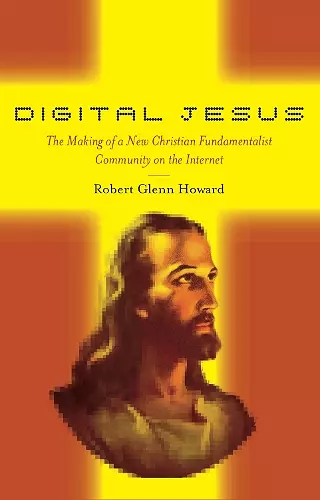Digital Jesus
The Making of a New Christian Fundamentalist Community on the Internet
Format:Hardback
Publisher:New York University Press
Published:16th Feb '11
Currently unavailable, and unfortunately no date known when it will be back
This hardback is available in another edition too:
- Paperback£23.99(9780814773109)

Documents how like-minded individuals created a large web of religious communication on the Internet, in essence developing a new type of new religious movement--one without a central leader or institution
A fascinating exposition of Christian online communication networks and the Internet's power to build a movement
In the 1990s, Marilyn Agee developed one of the most well-known amateur evangelical websites focused on the “End Times”, The Bible Prophecy Corner. Around the same time, Lambert Dolphin, a retired Stanford physicist, started the website Lambert’s Library to discuss with others online how to experience the divine. While Marilyn and Lambert did not initially correspond directly, they have shared several correspondents in common. Even as early as 1999 it was clear that they were members of the same online network of Christians, a virtual church built around those who embraced a common ideology.
Digital Jesus documents how such like-minded individuals created a large web of religious communication on the Internet, in essence developing a new type of new religious movement—one without a central leader or institution. Based on over a decade of interaction with figures both large and small within this community, Robert Glenn Howard offers the first sustained ethnographic account of the movement as well as a realistic and pragmatic view of how new communication technologies can both empower and disempower the individuals who use them. By tracing the group’s origins back to the email lists and “Usenet” groups of the 1980s up to the online forums of today, Digital Jesus also serves as a succinct history of the development of online group communications.
Digital Jesus offers an insightful contribution to all these discussions through a study of more than ten years of online interactions between American Christian fundamentalists. -- Paul Emerson Teusner * Journal of Religion, Media, & Digital Culture *
The book exemplifies the importance of exploring in careful detail the nature of lived religious practice online...Digital Jesusprovides a unique contribution to the study of religion and the internet. -- Heidi Campbell * Journal for the Scientific Study of Religion *
When it comes to media coverage of intolerance and the rise of Christian right or how the Internet is destroying sociability, sometimes it can seem that the only group more apocalyptic than the fundamentalists are the journalists themselves. Robert Glenn Howard's book provides a welcome alternative, an example of exactly the kinds of empirically grounded and sensitive research needed to understand the relationship between fundamentalism and the Internet in more subtle ways. -- William G. Pooley * Western Folklore *
Howard does a good job in introducing the overall practices of this brand of online Christianity. He also gives the reader a good sense of the group and many of its key members. -- Paul A. Soukup * Communication Research Trends *
Writing a succinct but comprehensive ethnographic account of early online Christian communities is a daunting task, but Robert Glenn Howard manages to pull it off with his hefty overview. . . Digital Jesus offers insight into the ways some Christians have moved away from formal institutionalized religion toward a virtual ekklesia, or online worship and fellowship space. -- Brittany Shoot * Sojourners Magazine *
A forceful and judicious study of the doomsday predilections of Christian Fundamentalist websites. Digital Jesus is uniquely positioned as a long-term analysis that tracks affinities toward intolerance and exclusion while also highlighting online sites that incorporate a more embracive and deliberative set of beliefs. -- Lee Quimby,author of Millennial Seduction: A Skeptic Confronts Apocalyptic Culture
One of the best current scholarly contributions to be found on the complex, creative, inventive, evocative world of Internet religion. Howard offers new and exciting insights on the power of non-institutional Christian Fundamentalism.Mandatory reading for any scholar working to understand contemporary vernacular religion, as well as the ever-changing culture of religious communication. It is equally compelling for general readers trying to perceive the direction of Christianity in post9/11 America. -- Leonard Primiano,Cabrini College
This is a very enriching book for any student both of the period of French History between the Religious Wars and the French Revolution. * Missiology *
Howard’s careful attention to rhetoric and language, his commitment to the framing tension of communal ritual deliberation and personal prophetic authority, and his understanding of the fragility and appeal of virtual subcultures makes this a valuable contribution to the field of religious studies and the subareas of Christian studies, new religious movements, and digital religion * International Journal for the Study of New Religions *
ISBN: 9780814773086
Dimensions: unknown
Weight: unknown
223 pages